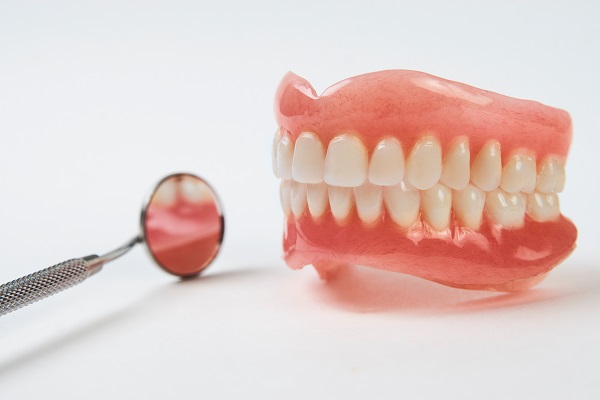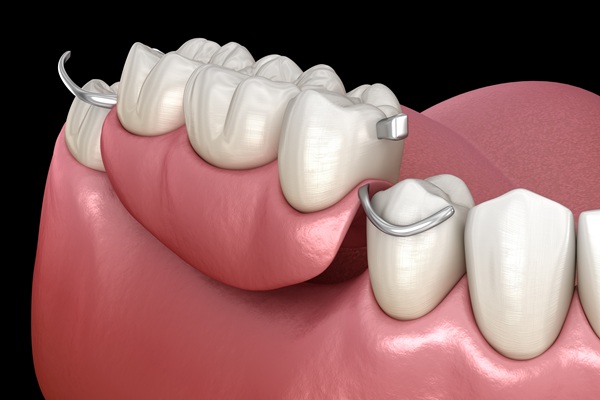Ask a Dentist: Why Shouldn’t I Wear Loose Dentures?

Let's cut to the root of the matter: wearing loose dentures is uncomfortable, dangerous, and often a source of embarrassment for their wearers - mainly when speaking or enjoying a meal.
Many patients don't realize the potential long-term impact of wearing loose dentures or that they don't have to spend months or years dealing with ill-fitting and uncomfortable ones.
How do they become loose?
The number-one cause of loose dentures is called bone resorption. They work by gripping the patient's gum line, allowing for a snug and natural fit. Unfortunately, because the jaw is no longer actively being used to secure and support the teeth, both the jaw and gums begin to recede over time.
This is the process referred to as bone resorption and the leading cause of looseness. While practicing good oral health can slow this process, many patients will still suffer denture discomfort because of the phenomena at some point in their lives.
What are the risks?
There are many severe downsides to living with loose dentures. These include long and short-term health issues, as well as social embarrassment and discomfort during daily activity.
Other common issues:
- Inflamed and painful gums
- Frequent oral sores
- Persistent headaches due to an uneven bite
- Nutrient deficiencies due to difficulty eating
- Advanced bone resorption in the jaw
More severe health risks include an increased risk of oral cancer and fungal infections of the mouth.
Other considerations
Many of our patients also report loss of confidence and self-esteem when they experience this looseness. Patients' discomfort and embarrassment when their dentures become dislodged at inopportune moments can cause significant mental distress and social anxiety.
Some patients suffering from looseness also notice undesired changes to their facial structure and appearance. This occurs because the teeth (and, by extension, dentures) play a vital role in supporting and "rounding out" the cheeks. Patients with looseness may notice sunken or depressed cheeks and other facial features.
Another social consequence of this looseness be a change in speech. Dentures that have excess movement in the mouth or become easily dislodged often cause lisps, slurred speech, difficulty pronouncing certain words, and excessive salivation when speaking.
How to tell if yours are loose
We always suggest scheduling an appointment with your dental specialist for the most precise diagnosis, but you may be suffering from loose dentures if you frequently:
- Experience gagging due to denture movement.
- Have red or swollen gums.
- Readjust them when speaking or eating.
- Struggle to bite or chew properly.
- Notice an increase in slurring, lisping, or salivating during speech.
Other less frequent symptoms include:
- Changes to appearance and facial structure
- Pressure sores
- Angular Cheilitis
- Stomatitis
- Advanced bone resorption
- And more
Luckily, this all can be treated by a skilled dental professional. While irritating, loose dentures are by no means uncommon, giving rise to various effective treatments.
Request an appointment here: https://cissdental.com or call CISS Dental & Orthodontics at (469) 656-5002 for an appointment in our Plano office.
Check out what others are saying about our dental services on Yelp: Dentures in Plano, TX.
Recent Posts
A dental bridge is often an important tooth-replacement option when one or more teeth are missing in the same area. Gaps in the smile affect chewing, speech, and overall oral health. Over time, missing teeth can also affect jaw alignment and place extra stress on the remaining teeth. Understanding how a bridge works helps patients…
Having one or multiple missing teeth can make life extremely difficult, whether it be for eating purposes or simply trying to smile. Thankfully, general dentists have a solution. Implant dentures are a popular choice when needing to replace multiple missing teeth. These custom-designed implants leave individuals with a more natural smile than what would be…
Visiting a new dental office for the first time can feel exciting and a little uncertain. Knowing what to expect can help make the experience smooth and stress-free. A first visit is a great opportunity to meet the dental team, discuss concerns, and help patients feel confident about their dental care.The front desk team usually…
Searching for a dentist near me often begins with convenience, but the range of services offered should be a top priority. A comprehensive dental practice not only addresses routine care but also provides advanced treatments to support long-term oral health. From preventive visits to restorative and cosmetic procedures, having access to the right services under…


